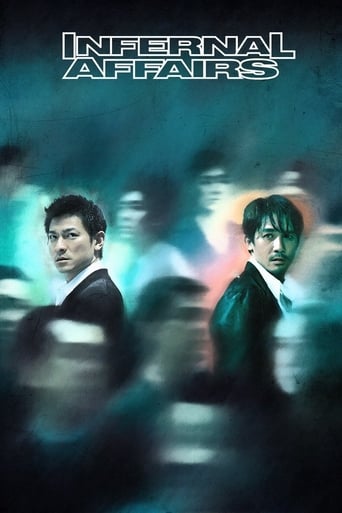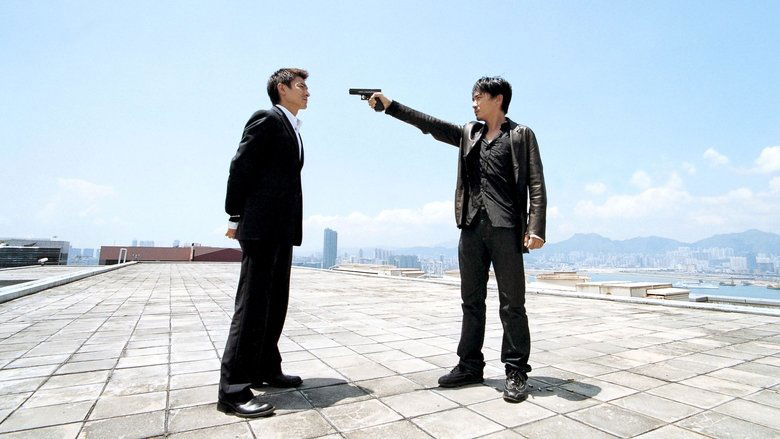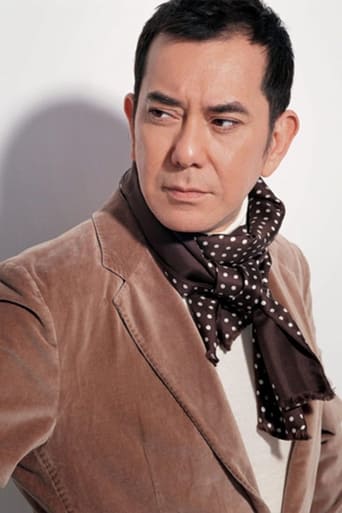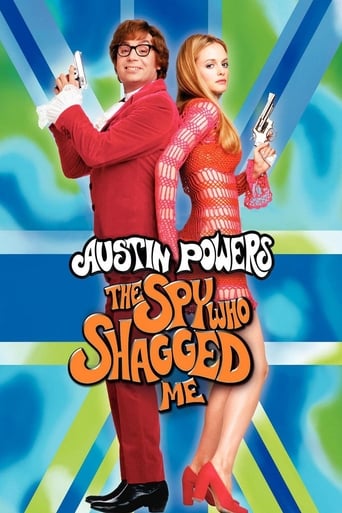Infernal Affairs (2004)
Chan Wing Yan, a young police officer, has been sent undercover as a mole in the local mafia. Lau Kin Ming, a young mafia member, infiltrates the police force. Years later, their older counterparts, Chen Wing Yan and Inspector Lau Kin Ming, respectively, race against time to expose the mole within their midst.
Watch Trailer
Cast
Similar titles



Reviews
A Disappointing Continuation
Funny, strange, confrontational and subversive, this is one of the most interesting experiences you'll have at the cinema this year.
This is a coming of age storyline that you've seen in one form or another for decades. It takes a truly unique voice to make yet another one worth watching.
A clunky actioner with a handful of cool moments.
Andy Lau and Tony Leung are two giants in Asian cinema and they play opposites in this cop thriller which pits two moles against each other in a complex hierarchy of modern Hong Kong. They are extremely prolific actors because they are capable, which is disappointing because the direction doesn't always allow for them to emote and fully display the gravity of their situation. When Superintendent Wong's lifeless body hurtles down onto the streets, the score instantly turns sentimental and we are treated to black and white flashbacks of their previous scenes, of that connection to Chan's old life instantly severed. But we must be emotionally manipulated into feeling this. When Lau's girlfriend discusses her novel's main character's morality, the score again turns from the tense percussion of the earlier scenes to this soft sentimental piano piece. Her description of this character who is supposedly a good person but who does bad things is so painfully unsubtle that it takes away from this great script. There's an early scene that allows Lau and Leung to display their talent, one that is not in Scorsese's Departed. A simple occurrence of a man buying a stereo allows us to roughly gauge what sort of person Chan is, before revealing he in fact works for the mob. And that stereo of course returns with significantly more important implications. Many of the segments of the script were directly lifted for Departed, and that is an indication of their importance, and their effectiveness. The thematic narrative is just as effective in dreary and gritty Hong Kong as it is in the Irish Catholic underbelly of Boston. There's the drug deal that is monitored from both sides, the respective moles relaying information that is delicately balanced and edited. It's a tense scene which the score better services, a heavy percussion backing over this plucked riff that seems strangely Egyptian, but it works. The tragic climax is also pretty much the same; with the unveiling of the secondary rat in the police department and this execution from Lau to tie up all lose ends and maintain his cover. I am intrigued by one of Scorsese's additions in making the mob boss a corrupt informant himself. Eric Tsang plays the triad leader in Infernal Affairs, and is unfortunately miscast (as he is a primarily comedic actor), too short and too jovial to really be menacing, although the breaking of the cast was a great moment which also served as a red herring of sorts. When Lau executes his former boss here, it's the culmination of his continued undercover life and realising that perhaps this act will lead to a promotion and a more comfortable life henceforth. When Damon does so in Departed, it's because he discovers that the man he is working for is in turn crooked, and his entire life's work and philosophy collapses onto itself. Both work just as well, as do their respective fates, although Nicholson proves to be the difference. We feel saddened by the tragic end of Chan, and the various ways in which his identity breaks down bit by bit. There is a flashback again as he discovers that Lau is the mole, but this one is integral and provides us with even more tension. Infernal Affair's script is a great one, and an original one, even if it's direction and visualisation is not entirely subtle. I am reminded of some better scenes in the film which utilise secondary characters (that are not Lau's placeholder girlfriend) to reinforce those themes of identity, morality and agency (as well as those Buddhist sentiments of rejecting destiny and fate introduced in the beginning). Are we really who we are if we cease to act in that way? Chan runs into an ex girlfriend while going for a massage, an inexplicable encounter, but her face shows only hints of recognition. She comforts her young daughter and talks of her marriage, things that are infinitely out of reach for Chan. Later, he is the sole person who witnesses the other mole's death, Keung, in a dramatic scene where the actor's face is visibly melting with condensation and he speaks on edge. It might be cliché to have someone utter such a confession before they die, but it's emotionally moving, because of the effective performance of that monologue, the yearning for a normal life that is mirrored in Chan's expression. In that penultimate meeting in the office, we agonise over the simple press of a button that erases a man's entire life. We know that Chan's life is over, a fact that he never is confronted with. Perhaps it is better that way.These moments are frustrating because they point to what could have been a great film if not for those over-dramatic death scenes, blatantly unsubtle exposition and unnecessary black and white flashbacks that connect the dots for the viewer as if they were a child. At that policeman's funeral, a teary Sum-Yee whispers to no one but the audience that she will dream of Chan just as he dreamt of her in those therapy sessions where they fell in love. Is this really necessary? But in saying that, we feel the same way for this fallen policeman.
The inspiration behind Scorsese's Oscar-winning The Departed, this Hong Kong original contains the core fabric of that story but few of its offshoots. It's strictly the tale of two double-agents, working both sides of the law in a desperate race to be the last man discovered, as the stakes climb steep and swift. Rapid and concise, it speeds impressively through some very tricky waters, effectively ratcheting the tension to an almost-unbearable level through both plot and cinematography. As a non-Mandarin speaker, it's often tough to keep pace with the lightning-quick subtitles, but strong performances from the two yin-and-yang leads saves the day on more than one occasion. Ballsy and cold-hearted, I wish the American adaptation hadn't spoiled so many of the twists for me. I have a hunch the ending would've been twice as jolting if it hadn't.
(59%) A slick, well made, modern Hong Kong big-hitter that tells its tale of undercover law enforcement perfectly well. This really tries to be more than just another far-east action movie, with plenty of screen time for the characters to breath, while the main focus surrounds plot development rather than fights and action. As this does almost shy away form action, which clearly does add more depth, but it also marks this apart from the simpler, more strait-forward movies of this type, which might put some people off. But if you stick with it and put the effort in, then you're rewarded with a deeper, more complex beast than most cop thrillers from this part of the world.
A story between a mole in the police department and an undercover cop. Their objectives are the same: to find out who is the mole, and who is the cop.Some of the film's brilliance is lost in translation. The Chinese title means "The Unceasing Path", a reference to Avici, the lowest level of hell in Buddhism, where one endures suffering incessantly. Translations tried to give the English title a reference to Dante's Inferno, a parallel that Westerners would understand. But is it really the same?The film gets increased American attention because it was remade as "The Departed". This extra attention is good, but the comparison of the two is not. While it is, indeed, a remake, they are not exactly the same film. Martin Scorsese moved away from the Triad theme and used Whitey Bulger as his background instead, at a time just before the Bulger story really broke. The context and connotations are completely different.












